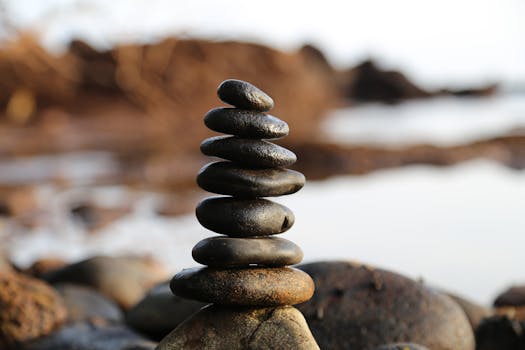
“
Mindfulness Practices for Stress Relief: Finding Inner Peace in a Busy World
Introduction to Mindfulness

Mindfulness is the practice of being present and fully engaged in the current moment, while letting go of distractions and judgments. It involves paying attention to our thoughts, feelings, and sensations without trying to change them. Mindfulness practices have been shown to reduce stress and anxiety, improve emotional regulation, and enhance overall well-being.
Benefits of Mindfulness for Stress Relief

The benefits of mindfulness for stress relief are numerous. Some of the most significant advantages include:
- Reduced stress and anxiety: Mindfulness practices have been shown to decrease the production of stress hormones like cortisol, leading to a decrease in anxiety and stress levels.
- Improved emotional regulation: Mindfulness helps us develop a greater awareness of our emotions and thoughts, allowing us to better regulate our emotional responses to challenging situations.
- Enhanced self-awareness: Mindfulness practices increase our self-awareness, enabling us to better understand our values, goals, and motivations.
- Improved sleep: Mindfulness has been shown to improve sleep quality, which is essential for overall physical and mental health.
Mindfulness Practices for Stress Relief

There are several mindfulness practices that can help reduce stress and anxiety. Some of the most effective techniques include:
- Mindfulness meditation: This involves focusing your attention on a specific object, such as the breath, a mantra, or a physical sensation in the body.
- Yoga: Yoga combines physical postures, breathing techniques, and meditation to promote relaxation and reduce stress.
- Body scan: This involves lying down or sitting comfortably and bringing your attention to different parts of the body, starting from the toes and moving up to the head.
- Mindful walking: This involves paying attention to your walking, noticing the sensation of your feet touching the ground, the movement of your legs and arms, and the rhythm of your breath.
Conclusion

Mindfulness practices offer a powerful tool for reducing stress and anxiety. By incorporating mindfulness into our daily routine, we can cultivate a greater sense of inner peace, clarity, and overall well-being. Whether you’re dealing with chronic stress or just looking to improve your mental health, mindfulness practices are definitely worth exploring.
See more:
https://www.mindful.org
https://www.yogaalliance.org
https://www.nimh.nih.gov/health/topics/stress/index.shtml






